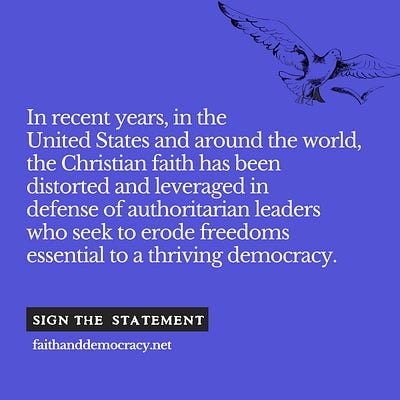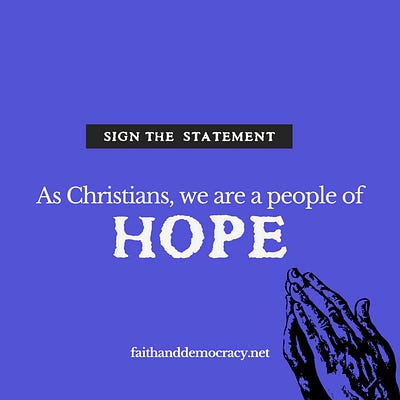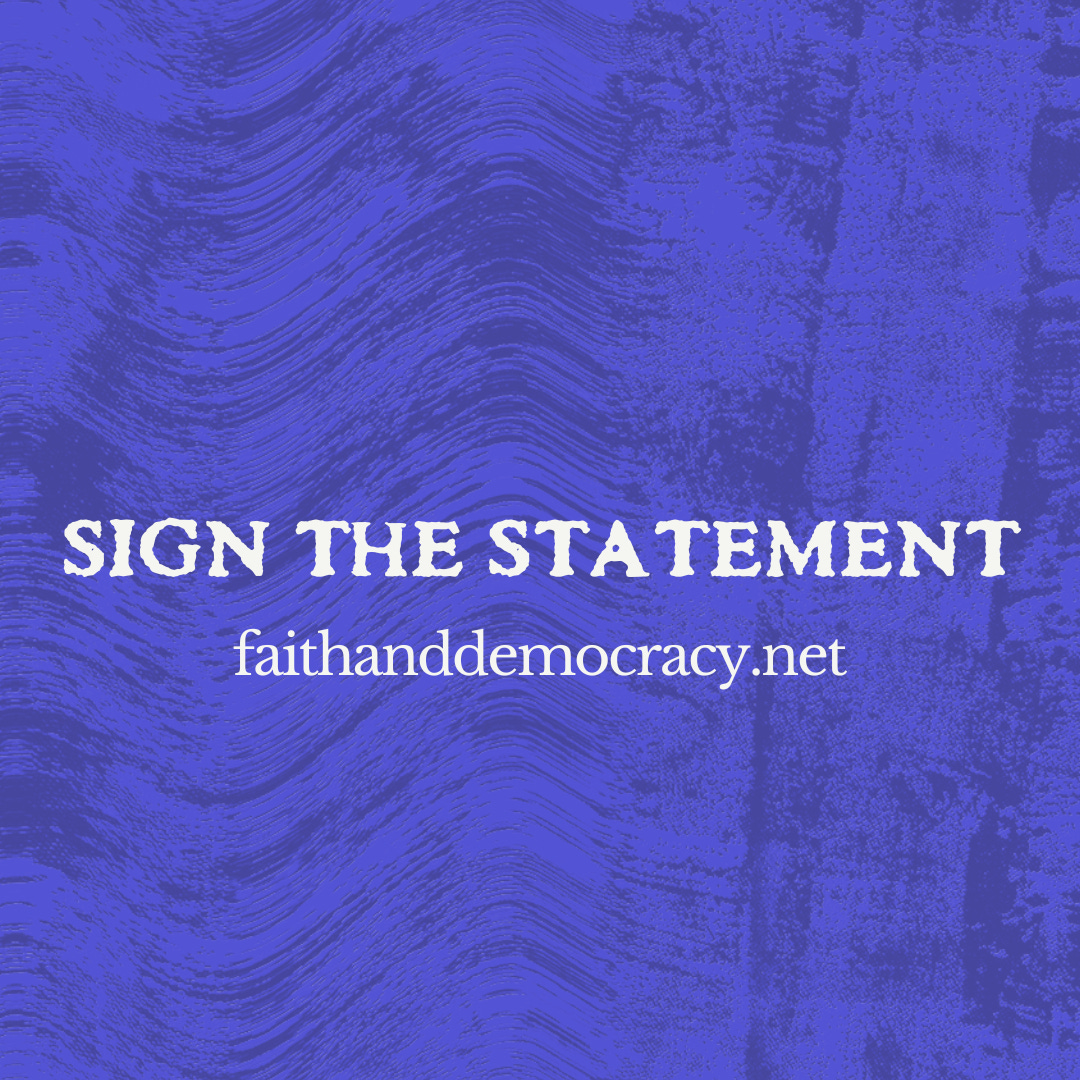
Friends, this letter and the subsequent statement from Jim Wallis and the Georgetown Center on Faith and Justice is worth reading and, I believe, signing. See what you think. I believe such a theological statement is as important as it is long overdue. It might be helpful to read the letter, then the statement. If you’d rather go straight to the statement click HERE.
~ In Faith, Hope, and Love,
Dan
In America we need better politics; but we also need better theology. A new statement, signed by a broad cross-section of more than 200 Christian leaders–nationally and locally–releases today. It is called Christian Faith and Democracy. You can read, sign, and use it in your congregations, with your pastors, and in talking with your friends and family across the country.
The key is that this statement is theological more than political.
It began here at Georgetown University, when a year ago some of us began something we called the “Theology of Democracy Project.” We had some small group meetings and agreed that many people, even in our churches, needed to go deeper than politics in a polarized political season like this. To begin that, we reached out to professors at other universities, choosing scholars and teachers rather than leaders of organizations, to help delve deeper into the theological issues now at stake.
We constructed a drafting group consisting of multiple church traditions: Catholic, Protestant, Evangelical, Black, Hispanic, Orthodox; wanting all of the traditions of Christianity in America to be heard and faithfully felt in any statement. We met weekly for many months, with conversations and emails and texts in between!
You can imagine the conversations like “We don’t use so many Bible verses in our theological tradition, and yes we have to! “ Or “Theology cannot be done without truth telling of America’s history of racial oppression.” We talked a lot about the reality of “human sin,” in our personal and national lives, what “repentance” requires, and how the structures and processes of democracy must address those threats of sin and the possibilities of progress together.
The statement begins with these words, “The United States confronts a crisis of democracy, and the American church confronts a test of faith.”
We and many others now see how this upcoming election, with its campaign atmosphere and its aftermath–which nobody yet knows, will be a test of our democracy. But we as theologians also see this moment and what comes from it as a test of faith.
The statement says, “This is a kairos time, to use biblical language– a moment that can change time, altering events for decades, even generations to come.” You will find biblical and theological language throughout the statement, instead of just political or partisan talk.
We are inviting you to read it and use it. It’s not long but focuses on the faith points we believe are so important in the weeks, months, and years ahead.
We start at the beginning with the first chapter in the first book of the Bible:
On the Imago Dei and Human Dignity. Core to Christianity is the belief that all people are made in the image and likeness of God (Gen. 1:26-27) and that our loving God is incarnate in the humanity of Jesus Christ. God’s love, therefore, embraces all of humanity and calls us to respect every person. Democratic governance is an outgrowth of our divinely endowed dignity and corresponding obligation to protect the rights, freedom, and equality of all.
Therefore “we reject any attempt to limit, suppress, intimidate, or subvert equal participation in our democracy on account of a person’s skin color, economic status, or political opinions.” Those are all literally an assault upon imago dei, the image of God.
At each point, this statement is practical as well as theological. What must we affirm and what we must reject as matters of faith.
Then the statement goes right to sin and how democracy can contain and counter our universal human failings and flaws. A good theology of democracy has to take our selfish human nature and the will to power very seriously.
On Human Sin. The scriptures attest that “all have sinned and fall short of the glory of God” (Romans 3:23). Although humans bear the divine image, the capacity for sin runs through every human heart, and every nation. Christians are not immune from this reality. The mechanisms of democracy, the balances of power, and the protections of a Constitutional framework rein in human tendencies to dominate, demean, and exploit.
Perhaps the greatest threat to democracy, and to faith today is the lack of truth telling and the outright lying we see and hear all around us in public and media spaces, and perhaps most alarmingly on the Internet. So we say:
On Truth and Integrity. We are called to speak truth, put away falsehood, and walk in integrity (Prov. 11:3; Eph. 4:25).Jesus said, “you will know the truth, and the truth will set you free” (John 8:32); therefore, the opposite of truth is captivity. A healthy democracy rests upon a foundation of truth.
Therefore, “we denounce the sowing of falsehood about election outcomes, the use of lies and half-truths by officials and candidates to distort truth, and the weaponization of fear and despair as a strategy to acquire or maintain power.” Again, theology must become practical and give us things to do to protect the truth.
Perhaps the most important question for democracy is the one a lawyer asked Jesus the Good Samaritan Parable, “Who is my neighbor?” This statement speaks directly to that question.
On Loving the Stranger and the Enemy. Jesus teaches us that loving God and loving neighbor are inseparable, and that loving our neighbors includes loving the stranger (Lk. 10:25-37) and our enemies (Mt. 5:44). We are obligated to reach out to those with whom we disagree, to empathize with those of different backgrounds and experiences, and to be hospitable to those who do not share our beliefs.
On Solidarity and the Common Good. Love of neighbor calls for the inclusion of all our fellow neighbors in the political process. Democratic participation enables individuals to live in service to, and in solidarity with one another– especially the marginalized among us. As Christians, we are called not merely to pursue self-interest, but to prioritize the collective good.
This theological statement calls out the idolatry of Christian Nationalism, in particular, as a false gospel that divides us.
Because democratic life requires pluralism, we repudiate political systems, parties, movements, laws, regulations, and policies that raise any group of people, including Christians, above others by granting them special rights and privileges. Specifically, we repudiate the tenets of Christian Nationalism and the idea that Christians or Christianity should hold a place of privilege and power in our nation’s governance.
Jesus’ instructions to us in the Beatitudes are literally central to a good theology of democracy. We are to be his disciples rather than practitioners of a politicized faith that leads to conflict. We say:
On Peacemaking and Bridge-Building. Jesus called peacemakers “blessed” and declared them “children of God” (Matt. 5:9). Rather than stir conflict and seed mistrust, Christians are to “live peaceably with all” (Rom. 12:18). In this spirit, Christians should collaborate with individuals and institutions—religious or secular—to work for the common good and for the realization of a more just world at peace.
And in particular, getting very practical again about the dangers we now see before us:
Because peace and stability are characteristics of a healthy democracy, we condemn the rising tide of violent language and behaviors, including violent threats and actions against public servants, election workers, and fellow citizens.
We believe that we must come to these questions about democracy and faith with a deep humble spirit and a commitment to move forward on principles yet unfulfilled.
We face this moment with great resolve and deep humility. Christianity has had an ambivalent and at times hostile relationship with democracy, as evidenced in colonial domination and the dispossession of indigenous peoples, the brutal enslavement of Africans, and the denial of women’s rights. We continue to reckon with the legacies of slavery and segregation, and with the enduring racism that limits achievement of a true multiracial democracy.
Many or most statements are just that: statements that have no lasting impact on people’s lives or society. This may be that too. But our hope and prayer is that these words might get through to many who are struggling to find the language to talk about this election and their faith.
How do we talk about faith in our congregations during this political season? With our pastors? Perhaps most difficult for many of us is how to talk to our families and friends, our dear loved ones, with whom we now find it so hard to discuss political things.
Our pastoral advice is to try and go deeper than politics to theology. What do we believe? What do we have in common? What does the Bible say and our deep and different Christian traditions teach us? What did Jesus say and mean and how do we act in obedience to Christ in faithful discipleship–in a time such as this? Let’s have that faith conversation; and we hope this statement might help.
We write in a moment of fierce urgency, as the people of God animated by faith, hope, and love. It is in this spirit that we reaffirm Christian support for democracy and invite all Christians and people of moral conscience to do the same.
We realize that signing such a statement can feel risky personally or professionally. But we as drafters decided it was a time to find the courage to stand up and speak out. So we invite you to read and sign if this message resonates with you as a Christian. And even more important, we invite you to share this message with others in your congregations, communities, and many social circles of engagement.
And, most importantly, it is time to pray together, fervently, for the state and future of our nation.
Our statement concludes with these words:
As Christians, we are people of hope. The resurrection of Jesus Christ powerfully attests that life overcomes death, and that what is to come is far better than what is; “Weeping may endure for the night, but joy comes in the morning.” Pressing forward with confidence in God’s sustaining care, we call on all Christians and people of good will to work together to reawaken democratic spirit and improve American democracy.
I invite you to join us by reading, signing, and sharing the statement.




